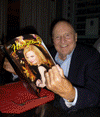You, yourself, have said that you “can be grumpy when you don’t get enough blood sugar.”
KT:
Sure, if I work too long, I can feel my energy sink and my blood sugar go down and I’m like, ‘OK, I know I’m getting grumpy now, time to stop.’ I just say, ‘Look guys, I’m getting out of sorts, and it’s not going to do any good.’
HS:
Do you think others are threatened by your strength?
KT:
Well, yes, I think quite possibly so. And I’ve never been competitive with other women. I’ve always thought that women are amazing, and I admire so many of us. But I do see that many women aren’t that way, and I don’t really understand it.
HS:
Does rheumatoid arthritis (RA) change the way you live your life?
KT:
It does, it does. I hate to admit to limits — that I have physical limits in what I can do and how much I have to rest and how much exercise I must do to keep everything moving, and keep the joints and the muscles strong so that the joints will not be overburdened, and watch the weight simply because you don’t want to carry too much. All of this is a constant thought process, and when you do eight shows a week, you’re like an Olympic athlete in training. Everything goes toward eight o’clock, curtain time, and so how much you eat, when you eat, how much you tire yourself during the day, how much sleep you get every night, how much you talk, everything has to be considered in light of the show that night.
HS:
You’ve said that you’re “best when you’re working.” You’ve said that you “can’t stand the pain (of RA) when you’re alone.” How do you manage your pain and addiction?
KT:
Well, you see in Martha that she sits in her house all day. She doesn’t have a job, she doesn’t have children, so she just starts to drink. I was drinking too much for the pain. And it’s very effective. Alcohol has been used forever as an anesthetic. And of course, I was stupid in that I thought I didn’t want to take pain pills per se, because I didn’t want to muck up my mind, thinking, ‘My body’s in enough trouble; I need to keep that,’ but not considering that alcohol did the same thing. Of course, once I realized that, finally...I think I got scared. I began to think, OK, this can only go in a bad direction. So that’s when I went to learn about this whole thing and find out how to fight it, how to maintain myself.
HS:
Do you think that your struggles with alcoholism and constant pain, as well as the loss of your father at a young age, have all contributed to the battered emotions you must tap in the role of Martha?
KT:
Yes, in many ways. Everything you do as an actor you take through yourself to some extent. I don’t honestly think I’d ever behave like Martha…. Well, it is a bit cathartic, you know, once I allowed myself to go that far, which you must… Everyone has varying degrees of pain. You know, I don’t feel any pain on stage. I never do, I never have. Once I had my toe broken on stage and I looked down, and there was blood all over, and I thought, ‘God, that would be great in the third act.’ After however many years of experiencing it, you learn to disregard it. I mean it’s constant.
HS:
That’s almost like being in a meditative state.
KT:
It is, actually. It is.
HS:
You’ve said that your late father was of “missionary stock,” and thought that “theater and acting were just one step up from being a streetwalker.” Were you always trying to get his approval?
KT:
Well yeah. My impression was always that he really didn’t take it seriously as a job, but not many people do. I mean, we don’t have exactly the respect in this country that one has in England, where it’s a valid profession. We keep thinking somebody picked ‘em up in a drugstore and said ‘Oh, you want to be a star?’
HS:
Well it seems like in this role, you get the acceptance that you always wanted from your father.
KT:
Oh that’s a lovely thing to play with. It’s another layer for me. I think it adds dimension, I think it adds to the understanding of the character.
HS:
OK, I don’t want to keep you any longer.
KT:
Yup, I gotta shut up now and save my voice for the show tonight. Thanks.




